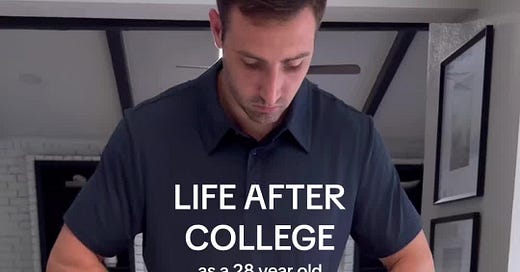Within my first few months of living in Dallas, I saw a car with a bumper sticker on it that read, “Keep Dallas Boring.” At first, I thought it was a jab at the city for its reputation as a cultureless, corporate purgatory, in contrast to Austin, where the unofficial city motto is, “Keep Austin Weird.”
But I decided I would take the bumper sticker at its word. I took the car’s owner to be saying that the boringness of Dallas is the best thing about it. We can’t let our city turn into Austin!
(By the way, “Keep Austin Weird” utterly failed. Austin is not remotely weird, for the simple reason that Facebook, Amazon, Tesla, etc. — all the companies that have opened offices in Austin over the past few years — are not weird. Austin is, if anything, more corporate than Dallas now, and it has worse traffic, which is really saying something.)
I remembered the bumper sticker this week after seeing a viral TikTok video by a fellow Dallasite, who had posted about “life after college as a 28 year old with a normal job”:
 Tiktok failed to load.
Tiktok failed to load.Enable 3rd party cookies or use another browser
People seemed to think the video was sad, a confession of quiet desperation. “Dystopian nightmare” was a typical comment.
There’s no question that the video presents a remarkably generic existence. I can’t identify where the guy lives; his house and office could be literally anywhere in the Dallas area from Oak Cliff to McKinney. It is not dystopia but otopia — no-place. He puts on standard business casual clothing, fills out TPS reports, then comes home and eats a frozen pizza.
(I later found out he lives in Plano, a city north of Dallas that has more residents than St. Louis.)
The guy seems fully aware that this version of his life looks boring. His whole TikTok account is like this. It’s a clever parody of the videos where a post-college professional showcases the “exciting” day in the life of a management consultant in New York or San Francisco: all company-paid Ubers and margarita towers and sticky-note ideation sessions and expensive salads. Those videos are dystopian. Often enough, the employees were put up to the task by their employers, who can use the videos to recruit the next cohort of workers.
We don’t know what the Dallas guy’s life is really like. He wears a wedding ring, though no spouse appears in the video. It’s almost like he shot and edited the video intentionally trying to present his life in the most boring way possible. (You can do that — amazing!) And, hey, maybe his life really is boring. But maybe not. I don’t know — what should his life be like? What should anyone’s?
“It is better to be interesting and wrong than it is to be right and boring.” I ran across this maxim in a New Atlantis essay (highly recommended) by Tara Isabella Burton about “postrationalists.” Don’t ask me what that means; just read the essay. The people Burton spoke to attribute the quote to one of their own, but it was originally coined by the astronomer Fred Hoyle. In the context of these postrationalists, it means that if you’re going to have ideas, have big, bold, outrageous ideas, without regard for consistency or truth. Just be interesting.
The maxim, alas, is wrong – which, perhaps, paradoxically proves its point. The statement presents the choice as a tradeoff, with the assumption that being boring is always worse than being interesting. But that’s not necessarily true. Interesting people lead us astray all the time. Malignant narcissists certainly keep things interesting. Meanwhile, people risk their lives every day crossing international borders to flee from violence in the hope that their lives might become a little less interesting.
In the bigger picture, most of human existence for two million years has been tenuous. For much of that time, our ancestors were still within the food chain. Lives were short. Is hunting and gathering interesting? Probably. There’s certainly little question of motivation if you know you will only eat what you find or kill. You always know why you’re getting up and heading out in the morning. Of course, any day could easily turn catastrophic.
We are lucky to be bored. Boredom is an achievement. It’s modernity’s great gift to us, though it’s a fragile one. Don’t take it for granted. Build your house on solid ground.
Someone who took my Academic Writing for the Public class two years ago, Alice Hutton Sharp, recently published a well-crafted, thoughtful essay in Plough, “Half-Pint’s War,” which she workshopped in that class. Alice is a historian, and she wrote about a relative she never met who died somewhere over Northern Europe while serving in the U.S. Army during World War II. It’s beautiful, sad, and ultimately humanisitc. Plough published it on Memorial Day, which is the perfect occasion for it, but it’s worth a read even a week later. From a craft-of-writing perspective, I think Alice does a terrific job of moving between scenic narrative and more discursive sections, where she reflects on the narrative and bigger, more abstract issues.
I’m currently in the middle of teaching that class again. If you are an academic who might be interested in taking it, please let me know. I hope to offer it again next summer.
And I think I have room in my fall schedule (early, though, mid-September or sooner) to travel to give a talk on burnout or some other topic. I’d be happy to speak about academic burnout at your university’s new-academic-year faculty development gathering. I did that last year at University of Northern Iowa and met some wonderful, dedicated faculty. I could also talk to faculty about writing for the public!
Otherwise, I’m already booking for next spring. If you’re interested in talking about an event, just reply to this email.
Thanks for reading.



